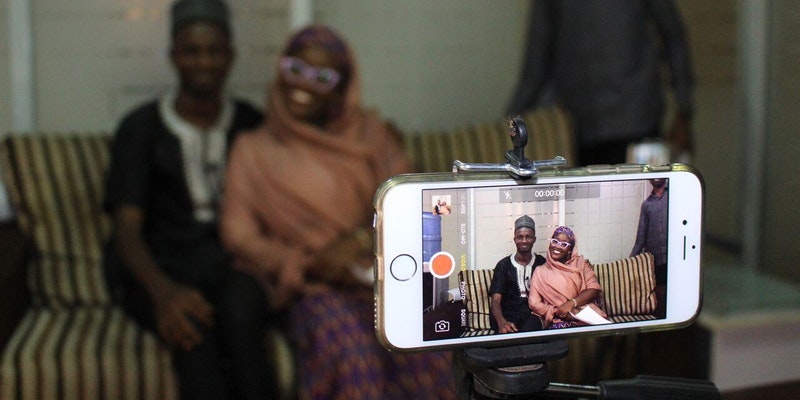
Improving Youth Sexual and Reproductive Health through Digital StorytellingKnowledge Management tool inspires people to view a topic in a new way
Storytelling is an incredibly powerful tool for social and behaviour change. It inspires people to view a topic in a new way or motivate them to make a positive change in their lives. Traditionally, storytelling has been done through face-to-face conversations. However, increased access to mobile phones and social media has changed the way that people can share and hear stories, as well as expanded the number of people reached by one person’s story.
Please join the Health Communication Capacity Collaborative (HC3) on Wednesday, August 23 from 9:00 – 10:00 am EDT to hear about the experiences of young sexual and reproductive health (SRH) champions who have used storytelling to mobilize others around the topic. Speakers will give tips for making quality and engaging videos and positively interacting with viewers. HC3 will also launch its newly developed FP INFOcus Guide, which provides step-by-step guidance for producing and promoting mobile phone videos that give young people the information they need to make informed contraceptive choices. Representatives from HACEY Health Initiative, a Nigerian non-profit organization, will share their experiences working with HC3 to pilot the FP INFOcus Guide and approach.
Webinar speakers include:
Daysha Veronica Edewi is a writer, director, producer and social media influencer who currently works for BuzzFeed as a Video Producer. At BuzzFeed, Daysha produces viral short-form video content, with a focus on sexual health, race and gender politics and body positivity. Her videos have been featured on the Huffington Post, Bustle and Refinery29, among other media outlets.
Muluba Habanyama is a journalism student at the Sheridan College Institute of Technology and an HIV activist. She was born HIV-positive and lost both of her parents to the virus. Since disclosing her status on YouTube in December 2014, she has been featured in various Canadian publications, as well as the MTV Staying Alive Foundation. She has a passion for education, engaging and empowering youth and has served as the national ambassador for the Canadian Foundation for AIDS Research’s (CANFAR) Kisses for CANFAR project.
Cori Fordham is a Program Officer with the Health Communication Capacity Collaborative, led by the Johns Hopkins Center for Communication Programs, and has over five years’ experience in global health and social and behaviour change. She supports the FP INFOcus project and co-authored the FP INFOcus Guide. Cori is passionate about using creative and innovative strategies to give key populations the tools they need to improve their health and well-being.
Winifred Imoyera is a Program Officer with HACEY Health Initiative, with five years’ experience promoting health in several parts of southern and western Nigeria. Using the FP INFOcus approach, Winifred has developed and shared a series of mobile phone videos aimed at increasing youth’s knowledge of long-acting reversible contraceptives.
David Adewoye is an IT and Communications Manager with HACEY Health Initiative. He has collaborated on several mobile and web-based projects, including HACEY’s FP INFOcus video series, and actively promotes the use of technology in addressing health challenges.
WHAT IS PANCAP?
PANCAP is a Caribbean regional partnership of governments, regional civil society organisations, regional institutions and organisations, bilateral and multilateral agencies and contributing donor partners established on 14 February 2001. PANCAP provides a structured and unified approach to the Caribbean’s response to the HIV epidemic, and coordinates the response through the Caribbean Regional Strategic Framework on HIV and AIDS to maximise efficient use of resources and increase impact, mobilise resources and build the capacity of partners.
What are the Global AIDS Strategy 2021–2026 targets and commitments?
If targets and commitments in the strategy are achieved:
- The number of people who newly acquire HIV will decrease from 1.7 million in 2019 to less than 370 000 by 2025
- The number of people dying from AIDS-related illnesses will decrease from 690 000 in 2019 to less than 250 000 in 2025.
- The goal of eliminating new HIV infections among children will see the number of new HIV infections drop from 150,000 in 2019 to less than 22,000 in 2025.
What are the 95-95-95 Targets for ending AIDS?
- 95% of People Living with HIV know their HIV status;
- 95% of people who know their status on treatment; and
- 95% of people on treatment with suppressed viral loads.
HELPFUL LINKS:
Global AIDS Strategy 2021–2026, End Inequalities, End AIDS
https://pancap.org/pancap-documents/global-aids-strategy-2021-2026-end-inequalities-end-aids/
Caribbean Regional Strategic Framework on HIV and AIDS (CRSF) 2019-2025
https://pancap.org/pancap-documents/caribbean-regional-strategic-framework-2019-2025/
